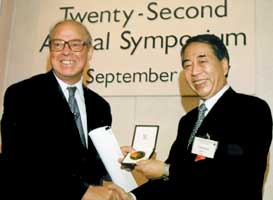Tokio Kanoh, a Japanese parliamentarian, former chairman of the World Nuclear Association (then the Uranium Institute), and a noted nuclear communicator passed away on 17 January. His engaging character and perceptive contributions to debate will be missed by colleagues in Japan and worldwide.
Kanoh was best known for his 12 years as a Liberal Democrat member of the House of Councillors, the upper house of the Diet, during which he worked to establish a sustainable energy policy for Japan through the Basic Act on Energy Policy of 2002. In industry he was a perceptive and clear communicator and a strong supporter of diversity through the organisation Women in Nuclear. In both of these areas of his life, Kanoh made best use of his natural openness and engaging character, happily entering and contributing positively to any kind of discussion or debate.
 |
| As chairman of the Uranium Institute, Tokio Kanoh in 1997 presented Hans Blix with the organisation's Gold Medal for his outstanding contribution to deployment of nuclear energy for peaceful purposes. |
Kanoh was born in Tokyo in 1935 and began his nuclear career with Tokyo Electric Power Company (Tepco) in 1957, shortly after graduating in law from the University of Tokyo. He added an economics degree from Keio University in 1964 and gradually ascended the corporate, academic and political worlds.
In the late 1970s Kanoh was a visiting lecturer on international affairs for the University of Tokyo as well as a member of prime minister Masayoshi Ohira's Policy Research Committee. In 1989 Tepco appointed him to lead their work on nuclear power acceptance.
From 1996-7 Kanoh was chairman of industry group the Uranium Institute, which in 2001 became the World Nuclear Association. During his time as the chairman, Kanoh saw the vital importance of national Women in Nuclear chapters and invited the president of the new Women in Nuclear Global network to present to the UI board. Kanoh gained approval for the UI to provide secretariat support for Women in Nuclear Global, which continues today. The network now spans 30 chapters and includes professionals from 109 countries.
By 1997, when Kanoh retired from Tepco, he had written several books, including 'Nuclear, now clear' which won the Energy Forum Prize. He had also advised the Japanese Ministry of Finance, the Minsitry of International Trade and Industry and the Science and Technology Agency.
Kanoh's years in the House of Councillors, the upper house of the Diet, began in 1998 and he served until 2010 for the Liberal Democratic Party, playing a key role in the 2002 Basic Act on Energy Policy enacted by prime minister Junichiro Koizumi.
This was recognised by the World Nuclear Association in 2002 with the WNA Award in recognition of his contribution to the promotion of nuclear power in Japan.
He retired from the Diet in 2010 and passed away after heart failure on 17 January. He is survived by his wife Ayako Hirata and children Nobuko, Takao, Naoko and Kenji.
Researched and written
by World Nuclear News






_55401.png)
_23009.jpg)




